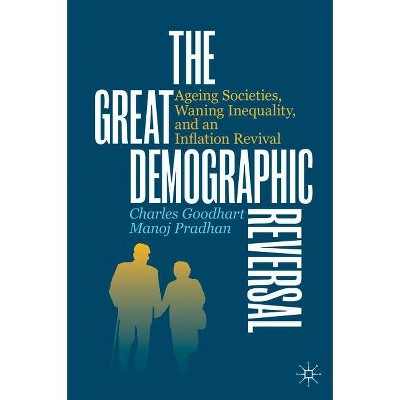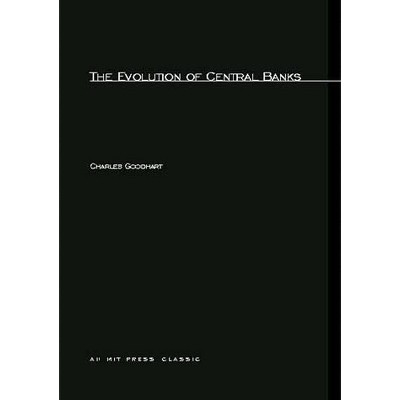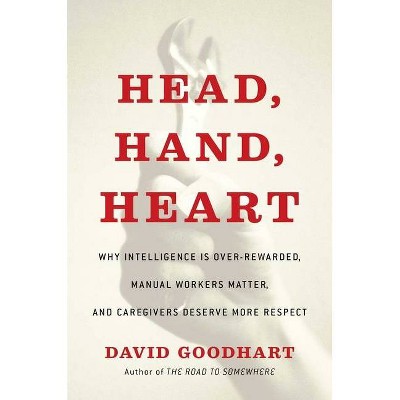The Great Demographic Reversal - by Charles Goodhart & Manoj Pradhan (Hardcover)

Similar Products
Products of same category from the store
AllProduct info
<p/><br></br><p><b> Book Synopsis </b></p></br></br>This original and panoramic book proposes that the underlying forces of demography and globalisation will shortly reverse three multi-decade global trends - it will raise inflation and interest rates, but lead to a pullback in inequality. "Whatever the future holds", the authors argue, "it will be nothing like the past". Deflationary headwinds over the last three decades have been primarily due to an enormous surge in the world's available labour supply, owing to very favourable demographic trends and the entry of China and Eastern Europe into the world's trading system. This book demonstrates how these demographic trends are on the point of reversing sharply, coinciding with a retreat from globalisation. The result? Ageing can be expected to raise inflation and interest rates, bringing a slew of problems for an over-indebted world economy, but is also anticipated to increase the share of labour, so that inequality falls. Covering many social and political factors, as well as those that are more purely macroeconomic, the authors address topics including ageing, dementia, inequality, populism, retirement and debt finance, among others. <p>This book will be of interest and understandable to anyone with an interest on where the world's economy may be going. </p><br><p/><br></br><p><b> From the Back Cover </b></p></br></br>This original and panoramic book proposes that the underlying forces of demography and globalisation will shortly reverse three multi-decade global trends - it will raise inflation and interest rates, but lead to a pullback in inequality. "Whatever the future holds", the authors argue, "it will be nothing like the past". Deflationary headwinds over the last three decades have been primarily due to an enormous surge in the world's available labour supply, owing to very favourable demographic trends and the entry of China and Eastern Europe into the world's trading system. This book demonstrates how these demographic trends are on the point of reversing sharply, coinciding with a retreat from globalisation. The result? Ageing can be expected to raise inflation and interest rates, bringing a slew of problems for an over-indebted world economy, but is also anticipated to increase the share of labour, so that inequality falls. Covering many social and political factors, as well as those that are more purely macroeconomic, the authors address topics including ageing, dementia, inequality, populism, retirement and debt finance, among others. <p>This book will be of interest and understandable to anyone with an interest on where the world's economy is going. </p><p/><br></br><p><b> Review Quotes </b></p></br></br><br><p>"I appreciate the global scope of this book and its emphasis on the complexity and interconnectedness of the global economy. This is the kind of long-term thinking that economists, policymakers, and others may find beneficial." (insurancenewsnet.com, June 25, 2021)</p><p>"I think this is a very good forecast. ... The book interestingly comments on an implied cycle in the standing of macroeconomics and macroeconomists. ... their argument is well worth pondering and entering into our considerations of the biggest economic risks ahead." (Alex J. Pollock, Law & Liberty, lawliberty.org, May 18, 2021)</p><p>"The Great Demographic Reversal is packed with informative charts and tables. It presents a powerful, well-argued challenge to the 'mainstream' view that low growth, inflation and nominal interest rates are here to stay. Above all, its message that everyday economics needs to take demography seriously is surely correct." (Diane Coyle, Financial Times, December 2, 2020)<br></p><p>"This thought-provoking book is a great read, and there is no need to be an economist to enjoy it." (Philip Turner, Central Banking, centralbanking.com, November 16, 2020)</p><p>"It is a pleasure to read a book this well argued. There is a good deal of careful analysis and there are lots of tables and graphs." (Charles Taylor, Financial World, November 2020-January 2021)</p><br><p/><br></br><p><b> About the Author </b></p></br></br><p><b>Charles Goodhart</b> was appointed to the newly established Norman Sosnow Chair of Banking and Finance at the London School of Economics (LSE) in September 1985, which he held until his retirement in 2002 when he became Emeritus Professor of Banking and Finance. He has remained at LSE at the Financial Markets Group, initially as Deputy Director, 1987-2005, and now a member in charge of the research program in financial regulation, 2005-present. He was elected a Fellow of the British Academy in 1990, and awarded the CBE in the New Years Honours List for 1997, for services to monetary economics. During 1986, he helped to found, with Professor Mervyn King, the Financial Markets Group at LSE, which began operation at the start of 1987. For the previous 17 years he served as a monetary economist at the Bank of England, becoming a Chief Adviser in 1980. Following his advice on overcoming the financial crisis in Hong Kong in 1983, and the establishment of the link between the HK and the US $, he subsequently served on the HK Exchange Fund Advisory Committee for several years until 1997. Later in 1997 he was appointed for three years, until May 2000, one of the four independent outside members of the newly-formed Bank of England Monetary Policy Committee. Between 2002 and 2004 he returned to the Bank of England as a (part-time) adviser to the Governor on Financial Stability. He became an economic consultant to Morgan Stanley at the end of 2009, where he remained until he resigned, at the age of 80, in 2016. It was during this period that he began work on the subject matter of this book with his colleague there, Manoj Pradhan.</p><p>Charles is the author of Goodhart's Law "that any observed statistical regularity will tend to collapse once pressure is placed upon it for control purposes".</p><p><b>Manoj Pradhan</b> is the founder of Talking Heads Macro, an independent macroeconomic research firm. Manoj was previously Managing Director at Morgan Stanley and led the Global Economics team there. He joined Morgan Stanley in 2005 after serving on the faculty of the George Washington University and the State University of New York. Manoj specializes in quantitative macroeconomics, emerging markets and global economics. He has a PhD in economics from the George Washington University and a Masters in Finance from the London Business School.</p>
Price History
Price Archive shows prices from various stores, lets you see history and find the cheapest. There is no actual sale on the website. For all support, inquiry and suggestion messagescommunication@pricearchive.us




















